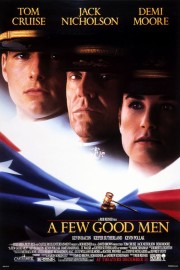A Few Good Men
Of all the Christmas traditions my family has shared over the years, the most bizarre has been our annual watching of Rob Reiner’s courtroom drama, “A Few Good Men,” whenever my grandfather would come visit during the holidays. Myself, my parents, and my grandfather first watched the film the day after Christmas in 1992, when it was released, and we all immediately loved it. From 1993 until 1999 (the last Christmas my grandfather came down before passing away in 2000), we would sit down at the TV and watch it. After my grandfather died, it didn’t feel right to continue the tradition.
This year, I am watching it again, even if it is for the sake of a review. However, this is one of those films I could probably review blind, which is a reflection not only of how much I love this movie, but also because of how many times I’ve seen it over the years. Case in point: we rented it during the summer of 1993 when we went up to Ohio, and by the time that vacation was over, I had Jack Nicholson’s famous speech at the end of the movie down cold. Of course, I couldn’t do Nicholson’s great performance complete justice, but that didn’t stop me from trying.
The film is an unlikely object of moviegeek obsession. It’s a military drama that deals with shady practices at the Marine base in Guantanamo Bay, Cuba, when two officers (Lance Cpl. Dawson and Pfc. Downey) assault a sub-par Marine named Santiago, who had gone outside the chain of command in asking for a transfer off of Gitmo. Santiago dies as a result of the assault. Were Dawson and Downey acting on their own? Their platoon leader, Lt. Kendrick (Kiefer Sutherland), supposedly gave his platoon orders that Santiago shouldn’t be touched, but the suspects– though acknowledging the blanket order –claim he came to them specifically to take action against Santiago. Such actions are called Code Reds, and have been deemed criminal actions by the higher ups. However, Guantanamo’s commanding officer, Col. Nathan Jessup (Nicholson, in an Oscar-nominated role), sees them as a necessary part of training. That doesn’t mean what Dawson and Downey did was an order from up on high, but that’s what Lt. Dan Kaffee (Tom Cruise) has to prove if he’s going to keep his clients out of jail for the rest of their lives.
The film, one of Reiner’s best, is based on a play by Aaron Sorkin (“The Social Network,” “Moneyball”), who also wrote the cracklingly good screenplay. Reiner knows when he has good material to work with, and he seems to just sit back, and let his actors do the heavy lifting. And man, does this cast deliver. This is a massive cast filled with major stars (Cruise, in one of his best performances, Demi Moore, and Nicholson), second-tier stars (Sutherland, Kevin Bacon), character actors (the most memorable of whom are Kevin Pollack, Christopher Guest, and J.T. Walsh), and even up-and-comers like Noah Wyle (pre-“E.R.”), Cuba Gooding Jr. (pre-“Jerry Maguire”), and Wolfgang Bodison, who came out of nowhere, and stunned Reiner with his striking performance by Dawson. There isn’t a false note in any performance, even if, by the end of the film, the action comes down to a showdown between Kaffee and Jessup that explodes into a moment that has been infinitely parodied, but also is unforgettable in how it hits right to the heart of the film’s themes of the tough, sometimes morally troubling decision that are made to keep our country safe.
That ambiguity is made crystal clear in the film’s finale. (Spoilers ahead.) Kaffee has gotten Col. Jessup to admit to ordering the “Code Red” on Santiago. He is taken into custody. The jury comes back in Dawson and Downey’s case with their verdict. Though they are acquitted of the first two charges (murder, and conspiracy to commit murder), on the third charge (conduct unbecoming a Marine), they are found guilty, and dishonorably discharged. This was a major point of contention between my mother and grandfather, who had a hard time understanding why Dawson and Downey were discharged, after we watched it the first time. Watching it over and over throughout the years, it still inspired debate. I can understand where my grandfather– who fought in the Battle of the Bulge in WWII –had issues, but as Dawson says when Downey can’t understand the decision, “We were supposed to fight for those who couldn’t fight for themselves. We were supposed to fight for Willie (Santiago’s first name).” By following this, particular order, they violated that code they are supposed to follow as Marines. A lesser movie wouldn’t have had the courage to make that point.
Though I don’t quite consider it a “great film” anymore (it’s a little too popcorn to take the ranks with a classic like “To Kill a Mockingbird” in terms of courtroom dramas go, to say nothing of not, quite matching up with 1992’s two, big masterpieces, “Unforgiven” and “Malcolm X”), it is still a great piece of Hollywood entertainment. In addition to the high drama of the courtroom scenes, the film is also intelligent and very, very funny (Cruise and Pollack, in particular, crack me up every time). It’s further proof that Reiner (also responsible for “This is Spinal Tap,” “The Princess Bride,” “When Harry Met Sally,” and “Misery” before this film) is one of Hollywood’s smartest filmmakers. When he’s given strong material, at least.










